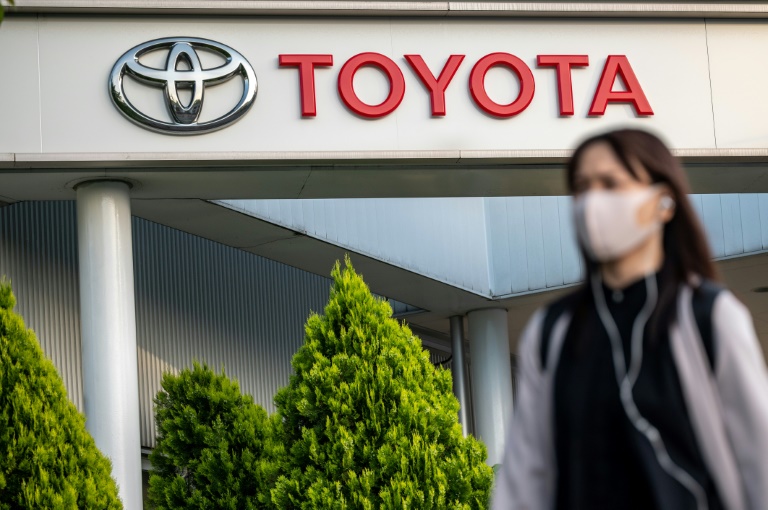Toyota on Wednesday posted a record full-year net profit helped by strong sales and a cheaper yen, but issued cautious forecasts as the pandemic and the war in Ukraine disrupt supply chains.
The Japanese auto giant, which kept its crown as the world’s top-selling carmaker in 2021, reported a net profit of 2.85 trillion yen ($22 billion), up 26.9 percent from the previous year.
But for the current year to March 2023, it said it expects to post an annual net profit of 2.26 trillion yen ($17.3 billion), citing ongoing uncertainties.
Toyota said its robust results were due in part to beneficial foreign exchange rates, with a cheaper yen helping inflate profits from sales abroad.
It also cited cost reduction efforts and stronger sales helped by marketing efforts.
In the year to March 2022, operating profit surged 36.3 percent year-on-year to three trillion yen, as sales increased 15.3 percent to 31.4 trillion yen — also a record.
Toyota’s strong sales came despite the firm being forced to repeatedly adjust production targets because of supply chain issues ranging from the semiconductor shortage to pandemic-linked factory closures.
On Tuesday, it said it was suspending production at eight domestic plants for six days due to the impact of China’s tough Covid measures — particularly in economic engine Shanghai, which has been under lockdown since April.
The closure forced Toyota to lower its global production target in May by 50,000 units to 700,000 vehicles, the latest in a string of revisions.
Operations were also hit by an earthquake in Japan and a cyberattack on a Toyota supplier.
The firm set a production target for the current fiscal year of 9.7 million units, after meeting a revised target of 8.5 million units for the year to March 2022.
“This fiscal year it’s going to be even more difficult than other years to make a forecast,” said chief communications officer Jun Nagata.
“Overall recovery from Covid-19 is going to be a big positive factor,” he said, but “raw material prices are soaring and the inflation in various areas will have an impact on the daily lives of people.”
“And then there is the Ukrainian factor, that is causing a lot of concerns in many areas,” he added, noting continuing constraints also with the supply of chips and other parts.
– Chips, currency, Covid, conflict –
Russia’s invasion of Ukraine is the most unpredictable factor for now, said Masayuki Kubota, chief strategist of Rakuten Securities.
“The chip shortage and the impact of Covid are issues that have been there for a while and drag on, but the more serious problem is Russia,” he told AFP.
“It is not clear how the Russia situation will turn out,” so companies are likely to issue conservative full-year forecasts, he added.
In March, Toyota said it would suspend operations at its only factory in Russia and stop shipping vehicles to the country.
Other factors though are likely to be more positive for the automaker, including the slide in the yen. The currency has touched 20-year lows against the dollar in recent weeks.
A weaker yen inflates the value of Toyota’s profits made overseas and some analysts believe this will help the firm and other Japanese automakers offset some of the challenges of the current business environment.
Rising commodity prices could also be a boon, said Kubota.
“Surge in gasoline prices have in the past worked in favour of fuel-efficient Japanese gasoline cars,” he said, though pricier commodities can also affect production costs.
Like other automakers, Toyota is still struggling with the impact of a global shortage of semiconductors — an essential component of modern vehicles.
Toyota has found itself unable to escape the crisis but is better placed than some rivals, having developed strong ties with domestic suppliers after Japan’s 2011 earthquake and tsunami.











